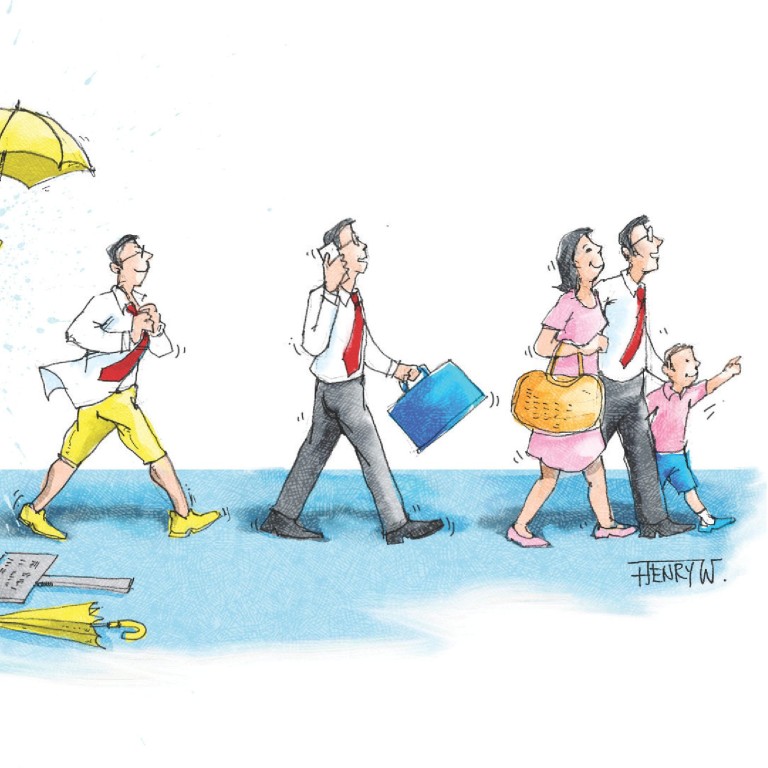
Now Hong Kong must get back to the basics of solving livelihood issues
Lau Ping Cheung says Hong Kong must now set aside political strife and refocus on the economy and livelihoods
When President Xi Jinping first announced his vision for an "economic belt along the Silk Road" on a visit to Kazakhstan in September 2013, the world listened, for the plan would conjoin the New Silk Road and the Maritime Silk Road, spanning more than 60 economies with an estimated total gross domestic product of US$22 trillion.
Meanwhile, the Asian Infrastructure Investment Bank, with an initial paid-up capital of US$100 billion, is expected to help fund the massive infrastructure needs of the Asia-Pacific region. With four pilot free trade zones already up and running (in Shanghai, Tianjin , Fujian and Guangdong), the 13th five-year plan starting next year, and the backing of a US$40 billion Silk Road Fund, China is welcoming the "new normal" with a slew of new initiatives and opportunities.
So much is happening on the mainland right now, yet it boggles the mind how little of it is being felt and talked about in Hong Kong, one of the key nodes in the ancient trading routes.
Instead, as economic opportunities galore beckon, Hong Kong is bogged down with disputes centred on political reform.
History has shown us, time and again, that a society split by political struggle or internal conflict will see its economy spiral downwards. The political turmoil that engulfed China in the three decades before the establishment of the People's Republic, and which continued to dog the communist government for years after, resulted in barely any economic growth. Similarly in Middle Eastern countries, including Syria, Egypt and Iraq, political upheaval has gone hand in hand with economic stagnation.
Hong Kong's economic performance has also been worrying. In 1997, its GDP was 20 per cent of mainland China's. Last year, it was just 3 per cent. Our economic growth has averaged less than 4 per cent since the handover, compared to Singapore's 6 per cent and close to 10 per cent for Shenzhen during the same period. In the mid-1990s, GDP per capita for Singapore and Hong Kong was each about US$25,000, but the former is now more than US$55,000 whereas ours is only about US$40,000.
It's time for Hong Kong to pay more attention to retooling its economy. According to a public opinion poll by Our Hong Kong Foundation, politics only comes fifth in a list of people's priorities, after housing, economic development, employment and health care. It therefore makes even more sense for Hong Kong to focus on improving people's livelihoods, regardless of what happens to political reform.
Hong Kong's ties with mainland China will only grow closer and deeper, whether Hongkongers like it or not. The best way forward for Hong Kong is to capitalise on these new initiatives and economic opportunities on offer in mainland China by leveraging our advantages.
As the world's freest economy and one of the world's leading international financial centres, Hong Kong is known the world over for its well-established international financial market, low taxation, sound banking system, strong legal system, abundant foreign exchange reserves, extensive international network, world-class professional services, effective and clean government, and real-time connectivity to the world's latest financial and economic happenings around the clock.
It is well placed to foster trade among the new Silk Road countries. With its robust capabilities and experience in finance, Hong Kong stands ready to help raise funds for the New Silk Road countries, whether they be loans, equity or bonds.
With a pool of some 1 trillion yuan (HK$1.3 trillion), Hong Kong is now the biggest offshore renminbi centre and can foster the trading and settlement of renminbi-denominated transactions and financial products.
With one of the world's most efficient airports, and one of the busiest container ports, Hong Kong is well positioned and reliable in the transport of goods, services and people for business arising from any economic activity.
Meanwhile, drawing on its rich experience from its large portfolio of infrastructure projects, the city is well placed to lend expertise to the projects funded by the infrastructure bank.
Last but not least, the city not only boasts a multicultural environment and a comfortable and safe living environment, but also has a visa-waiver programme that allows the entry of nationals from over 160 countries visa-free.
It can serve as a training centre for various kinds of skilled personnel that are needed for the colossal infrastructure projects funded by the new bank, as well as the financial and commercial activities evolving around "One Belt, One Road".
Hong Kong has all the software and hardware essential to play a critical role in the development of mainland China and the region. It stands ready to benefit from the massive opportunities now available, but only if it is resourceful while reviving its economy. Remember, opportunity waits for nobody.
On livelihood issues, housing is understandably Hongkongers' top priority. Home prices have shot through the roof, and we have more than 260,000 families on the waiting list for public housing and 85,000 families living in mostly illegal subdivided units. Commercial and office rents here are also among the world's most expensive, thus eroding Hong Kong's competitiveness.
The recent public outcry about the maltreatment of elderly residents at the Cambridge Nursing Home signals another social issue that will become more prominent as the Hong Kong population profile ages. We need better health care policies as well as more hospital beds and related facilities.
All of these need land, yet only 24 per cent of the territory is developed, and radical groups, some with ulterior motives, are opposing the construction of new homes and developments in the remaining, untouched 76 per cent. Why?
It's high time Hong Kong shifted its focus from political disputes to improving people's livelihoods.
